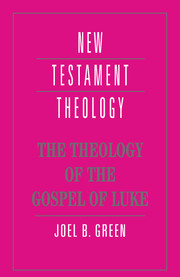Book contents
- Frontmatter
- Contents
- Editor's preface
- Preface
- List of abbreviations
- 1 “In the days of King Herod of Judea”: the world of Luke's Gospel
- 2 “God my Savior”: the purpose of God in Luke's Gospel
- 3 “A Savior, who is the Messiah, the Lord”: Jesus, John, and the Jewish people
- 4 “To proclaim good news to the poor”: mission and salvation
- 5 “Let them take up the cross daily”: the way of discipleship
- 6 “That you may know the truth”: Luke's Gospel in the church
- Further reading
- Index of biblical texts
- Index of modern authors
- Index of subjects
2 - “God my Savior”: the purpose of God in Luke's Gospel
Published online by Cambridge University Press: 05 June 2012
- Frontmatter
- Contents
- Editor's preface
- Preface
- List of abbreviations
- 1 “In the days of King Herod of Judea”: the world of Luke's Gospel
- 2 “God my Savior”: the purpose of God in Luke's Gospel
- 3 “A Savior, who is the Messiah, the Lord”: Jesus, John, and the Jewish people
- 4 “To proclaim good news to the poor”: mission and salvation
- 5 “Let them take up the cross daily”: the way of discipleship
- 6 “That you may know the truth”: Luke's Gospel in the church
- Further reading
- Index of biblical texts
- Index of modern authors
- Index of subjects
Summary
The Gospel of Luke narrates the long–awaited intervention and determined activity of God to accomplish his historic purpose. In Luke's rendering of this redemptive project, God is joined by others – both human and spiritual – working either to embrace and serve or to reject and oppose his aim.
This is good story-telling: the highlighting of a problem requiring a solution, the resulting motif of conflict raising readers' interest, building tension, and pushing the story along toward its climax. For Luke, though, this is much more than a good story. For him, this is the way things “were” and “are,” for the divine purpose and the conflict to which Luke's account bears witness was at the time of his writing still ongoing. Situated in the latter third of the first century GE, he relates the story of Jesus for more than entertainment, just as he does so for more than antiquarian interest or fidelity. His is an engaged and engaging accounting of the ministry of Jesus and Christian beginnings.
The struggle to achieve the divine aim Luke recounts did not reach its resolution in the Third Gospel, but spilled over into the activity of the Jesus-movement in Acts. In an important sense, then, Acts is grounded in the Gospel of Luke, just as the Gospel is grounded in God's purpose as related in Israel's Scriptures. What is more, the aim of God, by the end of Acts, had still not reached its consummation; nor had it done so by the time of Luke's own writing.
- Type
- Chapter
- Information
- The Theology of the Gospel of Luke , pp. 22 - 49Publisher: Cambridge University PressPrint publication year: 1995



